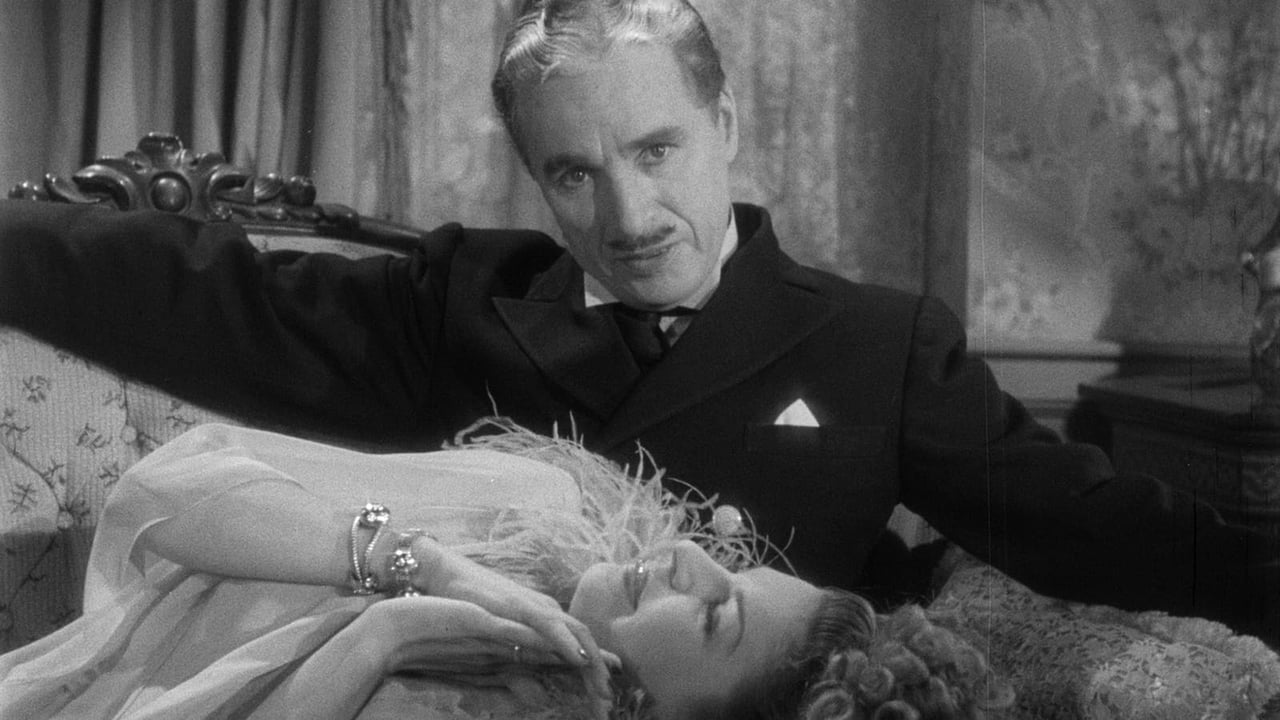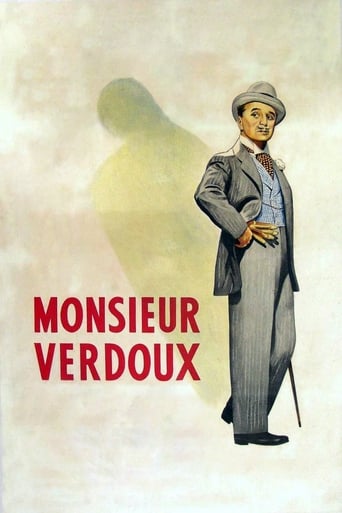



Truly Dreadful Film
Most undeservingly overhyped movie of all time??
While it doesn't offer any answers, it both thrills and makes you think.
View MoreA film of deceptively outspoken contemporary relevance, this is cinema at its most alert, alarming and alive.
View More. . . applies to the 143-second excerpt from the MONSIEUR VERDOUX (1947) feature film that the Criterion Company included on Disc 2 of its GREAT DICTATOR home entertainment release. This bit deals with a stock market crash, and Charlie Chaplin's character--Henri Verdoux--tells his broker, "Sell everything I have AT ONCE!" to which the latter replies, "Are you mad?! You were wiped out hours ago!" Then there's some newsreel footage of a couple World War Two Era dictators, Adolf Hitler and Benito Mussolini. Among the initial details of the market crash shown here are newspaper headlines, such as this one from Le Figaro: "Stocks Crash: Panic Follows" and another from "L'Humanite: "Banks Fail; Riots Ensue." Then there's some footage of a mob of normal people breaking out the windows of a Fat Cat Bank, and a random Money Mogul about to shoot himself because, as the Holy Bible says, "The love of Money is the Root of All Evil." Another Venal Banker jumps out of a high-rise window. This excerpt ends with the Hitler\Mussolini collage, capped by a "Le Figaro" headline, "Nazis bomb Spanish Loyalists; Thousands of Civilians Killed."
View Moreironic, cruel, almost dark, it is a special film in Chaplin's filmography. the treats are the same like in many other films by him. the final speech reminds the speech of the barber in The Great Dictator. so, the axis is a clever, almost wise manner to use the murder as tool for present the social events in a new light. the humor, the cynical decisions, the drops of Charlot, the art to define a tragedy in strange clothes are the pillars of a film who preserves the ideal who remains heart for each of his films. sure, it is a real temptation for imagine a Monsierur Verdoux by Orson Welles. but it is not easy to imagine than that Verdoux was Chaplin. the details, like in many other cases, represents the axis of this splendid movie. because it is a thriller and crime and social protest. but, in same measure, it is one of the most touching, for its cruel honesty, film by Chaplin.
View More"Monsieur Verdoux" is unlike any other Chaplin film that I have ever seen before for two reasons only, reason 1 the story is much different than Chaplin's stories to his other films for example The Kid (1921),and The Gold Rush (1925), reason 2 because Chaplin doesn't usually play villains in his movies and in this movie he does play the bad guy for the first time ever in his career and as a result he was deliberately snubbed for a best leading actor Oscar as well as an Oscar for best director but only got a screenplay nomination. The movie tells the story of a killer named Henri Verdoux (played by Charlie Chaplin) who murders women in order to support his wife and son (that is a true idea for Orson Welles to give to other filmmakers that were working around the time he started working in Hollywood), this movie is not only one of the best movies of 1947 it is one of Chaplin's best movies period alongside The Kid and the gold rush.
View MoreI suppose the only thing one has any right to expect from a Chaplin movie is the unexpected. If that's what you're looking for, Monsieur Verdoux won't disappoint you.Still, I have to confess that it disappointed me. There is none of the genius that makes his previous movie, The Great Dictator, one of the marvels of movie history. Most of this is just the mildly amusing story of a man who loses his job in a bank and so, to support his invalid wife and child, marries a series of foolish wealthy women and then kills them off for their money. It never considers the question of whether those marriages are consummated or not, whether he is therefore being physically unfaithful to his invalid wife, etc. In one scene we learn that he sleeps in the same room with one of his wealthy conquests, but that's it.Near the end, the political world starts to intrude more and more into this otherwise anodyne story, usually through newspaper headlines. We see that Europe is arming for another world war, that the Fascists kill innocent women and children in Spain, etc., while the plot meanders on.Then, finally, when the police start to catch up with Verdoux, he begins to give speeches about the mass killings in Europe, as if out of the blue. He suddenly has the voice we heard in The Great Dictator, but this time it comes out of nowhere, and it seems much less convincing. Is this really why Chaplin told a story of a man who poisoned wealthy widows, as a way of condemning European armament? In 1940's The Great Dictator such words had the terrible sound of foreboding prophesy. Several years after the war (1947), with no new war criminals portrayed after Hitler and Mussolini, this seems, basically, old news.I recognize Chaplin's genius, and wish I could talk about examples of it in his movie, but I really didn't see any. More's the shame.
View More